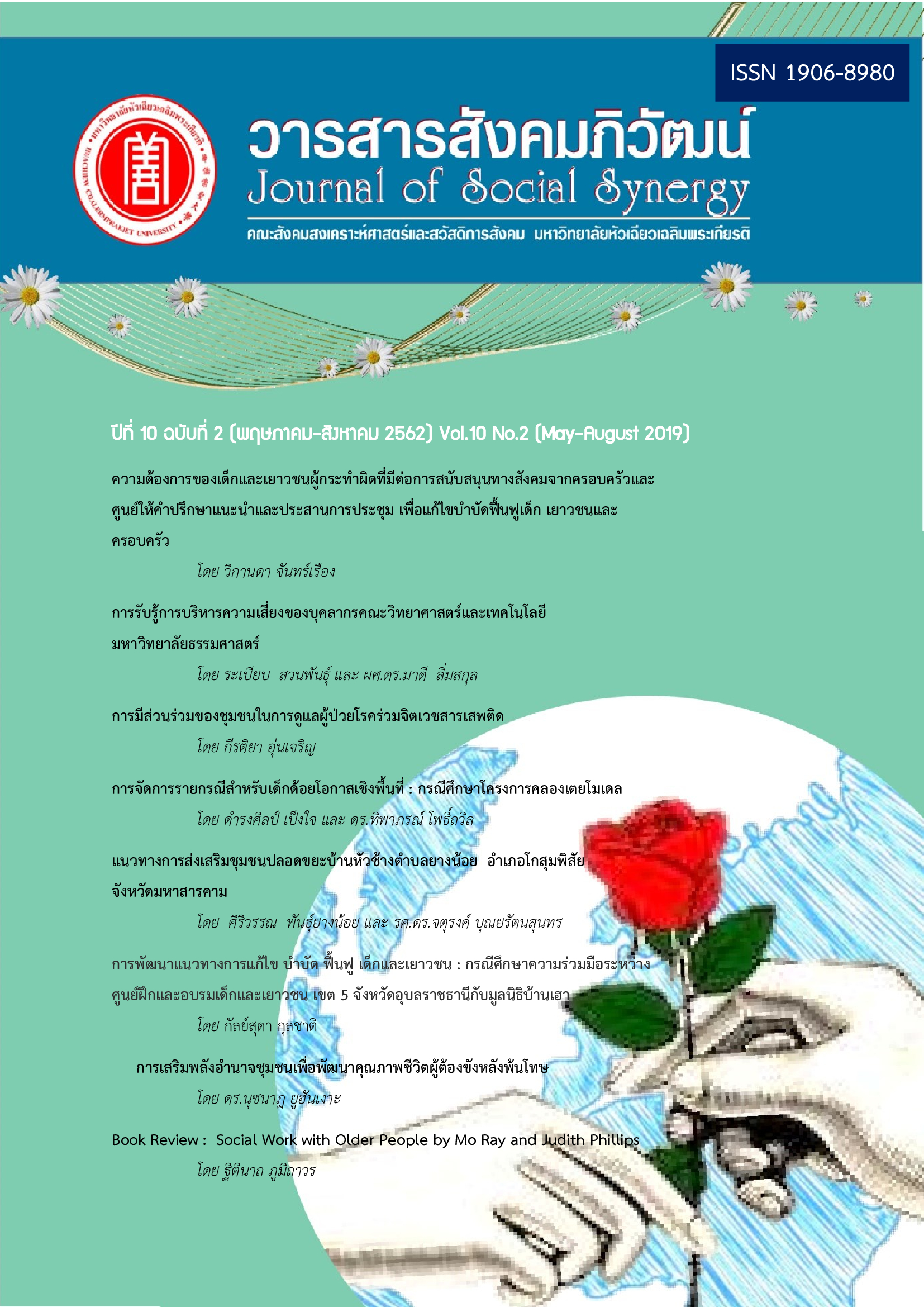Community empowerment for improve the quality of life for prisoners after acquit.
Keywords:
Empowerment, Community, the Quality of Life, Female Prisoners after AcquitAbstract
This article is part of the research “Community empowerment to improve the quality of life for female prisoners”. The objectives is building a community of concern to provide opportunities for prisoners who are punished by community and local leaders as well as people to participate, share and create areas of learning together happily. These article is qualitative research. The scope of research include presents the concept of empowerment for prepare community leader and member in community 6 village in Hantra Subdistrict, Mueang District, Phra Nakhon Si Ayutthaya Province that have to accept prisoners after being released back to their families and communities. The research methodology is to provide training counseling and leadership with community leaders. After that the community leaders extended result by persuade the members in community from 6 villages that especially at risk groups and families as well as the former inmates of Hantra Subdistrict participated in empowerment activities. "Missed steps" are in the form of open groups, 6 times, 20-30 people at a time, totaling 110 participants. The results of the study show that community leaders, members at risk and their families as well as those acquitted from the testimony, hearsay, share suffering experience and learned from wrongdoing. Its results show that people in the community are concerned about each other as a basis, and the culture of opening the heart to listen as friends help friends. It creates a broader perspective in the meaning of error by understanding, accepting and giving opportunities for oneself and others. It is the power to strengthen the internal power to prevent the use of power to induce the cycle of evil, including self-esteem, being ready to develop one's potential in order to have knowledge, ability and skills in transferring experiences through the steps that have been missed to other people. Suggestions the prison, Hantra subdistrict administration organization, Sarm Palang Hantra group and others network have to integrated and support volunteer or community leader take action to help with prisoners and acquitted systematically and extended to other communities.
References
อภิญญา เวชยชัย. (2555). การเสริมพลังอำนาจในการปฏิบัติงานสังคมสงเคราะห์. กรุงเทพ: มหาวิทยาลัยธรรมศาสตร์.
อวยพร เขื่อนแก้ว. (ม.ป.ป.). การปรึกษาเพื่อฟื้นฟูอำนาจและสร้างเสริมศักยภาพแนวสตรีนิยม. เชียงใหม่ : ศูนย์ผู้หญิงเพื่อสันติภาพและความยุติธรรม.
Dressel, P. (1992). Patriarchy and social welfare work. In Y. Hasenfeld (E.d), Human services as complex organizations. Newbury Park, CA: Sage.
Lorraine M. Gutierrez, Ruth J. Parsons, Enid Opal Cox. (2003). Empowerment in Social Work Practice. USA. Wadsworth Group.
Judith A.B. Lee. (1996). “The Empowerment Approach to Social Work Practice” In Francis J. Tuner, ed., Social Work Practice: Interlocking Theoretical Approaches. New York: Free Press.
Judith A.B. Lee. (2001). The Empowerment Approach to Social Work. (Second Edition). New York : Columbia University Press.
Robert Adams, (2003). Social Work and Empowerment. (Third Edition). England. Palgrave Macmilan
Ruth J. Parsons and Jean East. (2013). Empowerment Practice. Retrieved July 20, 2018, from http://socialwork.oxfordre.com/view/10.1093/acrefore/9780199975839.001.0001/acrefore-9780199975839-e-128
Simon Barbara Levy. (1994). The Empowerment Tradition in American Social Work: A History. New York: Columbia University Press.
Wenocur Stentey and Reish Michael. (1989). From Charity to Enterprise: The Development of American Social Work in a Market Economy. Urbana: University of Illinois Press.
Whitmore, E. (1988). Participation, empowerment and welfare. Canadian Review of Social Policy, 22, 51-60.
Zimmerman, M. A. (2000). Empowerment theory: Psychological, organizational, and community levels of analysis. In J. Rappaport & E.Seidman (Eds.), Handbook of community psychology (pp. 43–63). New York, NY: Kluwer Academic/Plenum.
Downloads
Published
How to Cite
Issue
Section
License
บทความที่ได้รับการตีพิมพ์เป็นลิขสิทธิ์ของวารสารสังคมภิวัฒน์ มหาวิทยาลัยหัวเฉียวเฉลิมพระเกียรติ
ข้อความที่ปรากฏในบทความแต่ละเรื่องในวารสารวิชาการเล่มนี้เป็นความคิดเห็นส่วนตัวของผู้เขียนแต่ละท่านไม่เกี่ยวข้องกับมหาวิทยาลัยหัวเฉียวเฉลิมพระเกียรติ และคณาจารย์ท่านอื่นๆในมหาวิทยาลัยฯ แต่อย่างใด ความรับผิดชอบองค์ประกอบทั้งหมดของบทความแต่ละเรื่องเป็นของผู้เขียนแต่ละท่าน หากมีความผิดพลาดใดๆ ผู้เขียนแต่ละท่านจะรับผิดชอบบทความของตนเองแต่ผู้เดียว




